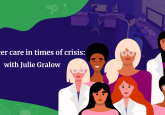Navigating opportunities and challenges in pancreatic cancer: an interview with Mandana Kamgar

 Dr Mandana Kamgar is an Assistant Professor of Medicine at the Medical College of Wisconsin (WI, USA). She is a medical oncologist, who primarily takes care of patients with pancreatic cancer. Her research is focused on finding biomarkers of response to treatments in pancreatic cancer, and identifying individualized therapies based on the molecular make-up of the tumor in each patient. Here our Senior Editor, Jade Parker, speaks to Mandana about the impact of social and economic factors on women entering oncology and how Kamgar hopes the field of pancreatic cancer will advance.
Dr Mandana Kamgar is an Assistant Professor of Medicine at the Medical College of Wisconsin (WI, USA). She is a medical oncologist, who primarily takes care of patients with pancreatic cancer. Her research is focused on finding biomarkers of response to treatments in pancreatic cancer, and identifying individualized therapies based on the molecular make-up of the tumor in each patient. Here our Senior Editor, Jade Parker, speaks to Mandana about the impact of social and economic factors on women entering oncology and how Kamgar hopes the field of pancreatic cancer will advance.
What motivated you to pursue a career in clinical oncology and how have you overcome challenges along the way?
I was always interested in translational research. A type of research that brings the research from laboratory to clinic with the hope that it can help patients directly. Oncology is an area with extensive opportunities for such research and practice. I am a pancreatic cancer oncologist. This is a cancer which is very difficult to treat. Many drugs or approaches that work in other cancers, do not work for pancreatic malignancies. There have been many challenges along the way, as expected. Many are inherent to the disease itself. Losing a patient to this cancer is always heartbreaking. I have a strong belief, however, the breakthrough for pancreatic cancer early diagnosis and treatment is on the horizon. This keeps me motivated. I am also blessed to have outstanding colleagues and collaborators which makes translational research and clinical practice much easier. But most importantly, I am humbled and motivated by the bravery of the patients that I care for. They willingly participate in clinical trials, facing many unknowns, hoping to push the boundaries in pancreatic cancer treatment, to improve the outcomes.
Are there specific areas within your field that you see opportunities for more women to make significant contributions?
The field of oncology is very welcoming to women. We already have many female leaders in the research and clinical practice of oncology. What is great is that many of these leaders are supporting and mentoring young female clinicians and researchers to follow their footsteps.
How important has mentorship been in your career? Have you had any notable role models or organisations who influenced your journey?
Medicine is an art, which is greatly learned through apprenticeship. I have been blessed to have great mentors all through my medical studies and now medical practice. Without exception, in any institution that I have been, I have found great mentors. I would not be where I am in my career, without my mentors. I am thankful for all of their support, and hopeful that I can serve by example for the next generation of oncologists.
Are there specific policies or initiatives that you believe could enhance the work of women in medical careers?
I was not born in the United States. I was born in Iran, and later immigrated to the US. As an outsider, I can see certain factors in education and career here, that makes work difficult for women. The cost of education in the US is very high. This prohibits many women, and for that matter men in pursuing certain careers such as medicine. The social structure in the US is such that support from extended family for childcare is frequently absent. This, combined with the high cost of childcare makes dedication to work and career growth difficult for women. Affordable childcare is crucial to female career growth.
Could you tell us about the latest developments in diagnostic and therapeutic options for pancreatic cancer patients?
We are now moving towards the era of precision medicine. We have the tools to identify the unique molecular characteristics of the cancer in each individual and are learning how to personalize our treatments. Immunotherapy, which is the effort to awaken the immune system of an individual against the cancer in their body, is being explored and improved in many cancers, including pancreatic cancer. Blood tests are being developed to find the cancer in the earlier stages, and efforts are made to find vaccines that can prevent cancer in such individuals. Many of these are still under development, however, and not ready for clinical use yet. I am hopeful for our patients with pancreatic cancer. I hope to see the cure to this devastating cancer in my lifetime.
The opinions expressed in this interview are those of the author and do not necessarily reflect the views of Oncology Central or Future Science Group.




